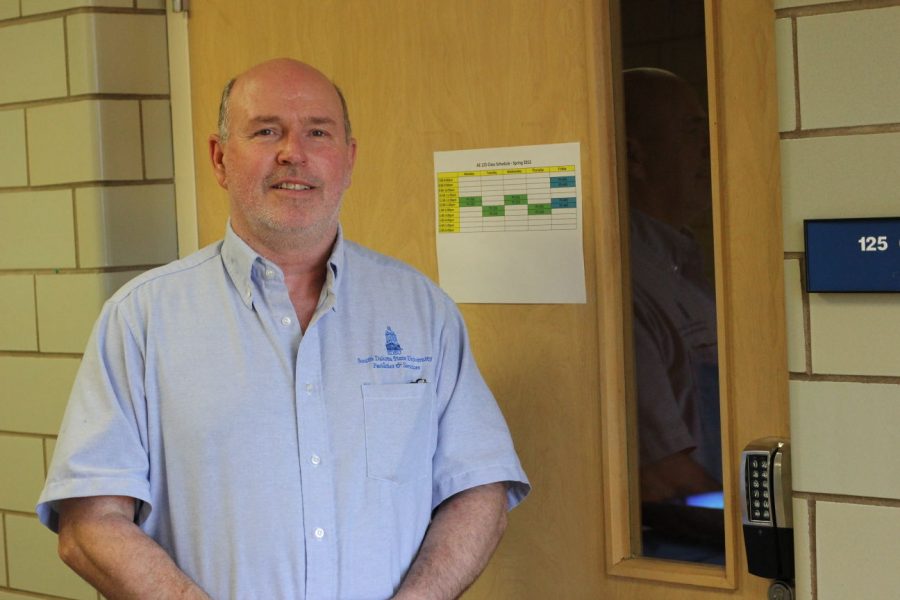LOCKED OUT
January 28, 2015
Any student on campus who has been locked out of their residential hall room knows the importance of locks and keys. Some students quickly learn the necessity of keeping track of their keys.
Building maintenance supervisor Tony Filholm explained why this is, while also explaining a lot about locksmithing.
Filholm said that when keys to doors on campus are lost, it is a liability issue for the university. Locks with missing keys on campus must be changed immediately. “People’s security is first and foremost,” Filholm said.
The 2014-2015 SDSU Housing & Residential Life Residential Handbook states the policy about losing keys to residential hall rooms. A lost key can result in a serious security problem for residents. When a resident reports they have lost a room key, a work order is generated to change the locks and replace keys for all residents of the room. The responsible resident is charged a fee for the replacement. The fee assessed covers the replacement cost of the lock for the room door, mailbox, labor, and new keys. Charges range from $50 to $80.
“[The policy] is a good idea, because it keeps students responsible,” sophomore Logan Meyer, a business economics major, said.
Filholm’s dad bought a lock shop in Brookings in 1972 and Filholm has been working with locks since he was 9 years old. He also began doing limited commercial locksmithing jobs at age 15. Filholm began working for SDSU in 1986.
His father along with his brother, Mike, run the lock shop in Brookings, while his other brother, Pat, runs a lock shop in Perry, Ga. and his third brother, Tal, works for a door company in Denver, Colo. “We’re kind of a family of locksmiths,” Filholm said.
On campus, Filholm’s official title is building maintenance supervisor, but he also oversees a staff of one fully trained locksmith and two partially trained locksmiths.
He said he is working on training his partially trained locksmiths to a fully trained level. Filholm said the one fully trained locksmith, Aaron Busmann, currently does about 85 to 90 percent of the locksmith work at SDSU.
One vacancy is also available on the locksmith staff that Filholm said could be filled by a student interested in locksmithing. The vacancy was created by the retirement of Leon Lengkeek. Lengkeek worked on campus for 25 years and did a lot of work for Filholm.
The locksmith shop handles a wide variety of work orders. The most common job for Filholm’s staff is changing locks on residential hall rooms when students lose keys. He said his staff changes an average of six to 10 of these types of locks per week. During breaks when no students are on campus this type of work decreases, but after football camps and other types of events in which visitors use SDSU residential halls, there is a good chance that this workload will increase.
The locksmiths are also responsible for changing locks when departments move to a new location on campus or when there is a change in faculty or an individual faculty member moves to a new location.
Filholm wants to clarify a common misconception about the procedure of changing locks in the residence halls. He said the misconception is that when locks are changed on residential hall rooms, they are reused on a different residential hall in the same building.
“The lock cores are reused but the [internal parts] of the locks are reworked and new keys are cut,” Filholm said.
The locksmiths fall under the General Services Department and are also responsible for a long list of items outside of changing and working with locks. They conduct annual inspections of the fire extinguishers on campus and line up the contractors to clean hoods and inspect fire suppression systems in the kitchen and handles surplus property, including coordinating the annual surplus auction. Filholm said his staff also does the jobs that other departments don’t want to do or are unable to do, or that the university can’t figure out which department to assign to the job.
One example Filholm gave of this was the installation of a camera on the top of the new Sanford Jackrabbit Athletic Complex that his staff completed recently.
Filholm said every member of his staff is a “trained and certified Asbestos Abatement Professional.”
Filholm said to be a member of his locksmith staff the person should be a master of locksmithing but also a jack-of-all-trades.
“[We] do all kinds of things. There is a lot of variety, which makes it interesting. You can’t guarantee you’re doing the same thing everyday.”
Dean Kattelmann, the Assistant Vice President of Facilities and Services has a high level of respect for Filholm and his staff.
“Mr. Filholm is a very important individual on my support staff. During the day, his staff will perform preventative maintenance on numerous doors. His shop goes about their business as the unsung hero of campus,” Kattelmann said.
























